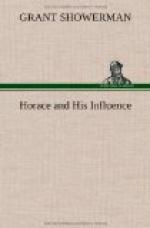O_ the song where not one of the Graces_
T_ightlaces_,—
W_here we woo the sweet Muses not starchly_,
B_ut
archly_,—
W_here the verse, like a piper a-Maying_
C_omes
playing_,—
A_nd the rhyme is as gay as a dancer_
I_n
answer_,—
I_t will last till men weary of pleasure_
I_n
measure!_
I_t will last till men weary of laughter_
...
A_nd
after!_
Whatever we may say of the indebtedness of things like these to the letter of the ancient poet, we must acknowledge them all alike as examples of the dynamic power of Horace.
ii. CREATION
But there are other examples whose character as literary creation is still farther beyond question. Such a one, to mention one brilliant specimen in prose, is the letter of Andrew Lang to Horace. In verse, Austin Dobson again affords one of the happiest examples:
TO Q.H.F.
“H_oratius Flaccus_, B.C. 8,”
T_here’s not a doubt about the date_,—
Y_ou’re
dead and buried_:
A_s you observed, the seasons roll_;
A_nd ’cross the Styx full many a
soul_
H_as Charon ferried_,
S_ince, mourned of men and Muses nine_,
T_hey laid you on the Esquiline_.
A_nd that was centuries ago!_
Y_ou’d think we’d learned
enough, I know_,
T_o help refine
us_,
S_ince last you trod the Sacred Street_,
A_nd tacked from mortal fear to meet_
T_he bore Crispinus_;
O_r, by your cold Digentia, set_
T_he web of winter birding-net_.
O_urs is so far-advanced an age!_
S_ensation tales, a classic stage_,
C_ommodious villas!_
W_e boast high art, an Albert Hall_,
A_ustralian meats, and men who call_
T_heir sires gorillas!_
W_e have a thousand things, you see_,
N_ot dreamt in your philosophy_.
A_nd yet, how strange! Our “world,”
today_,
T_ried in the scale, would scarce outweigh_
Y_our Roman cronies_;
W_alk in the Park,—you’ll
seldom fail_
T_o find a Sybaris on the rail_
B_y Lydia’s
ponies_,
O_r hap on Barrus, wigged and stayed_,
O_gling some unsuspecting maid_.
T_he great Gargilius, then, behold!_
H_is “long-bow” hunting tales
of old_
A_re now but duller_;
F_air Neobule too! Is not_
O_ne Hebrus here,—from Aldershot?_
A_ha, you colour!_
B_e wise. There old Canidia sits_;
N_o doubt she’s tearing you to bits_.
A_nd look, dyspeptic, brave, and kind_,
C_omes dear Maecenas, half behind_
T_erentia’s
skirting_;
H_ere’s Pyrrha, “golden-haired”
at will_;
P_rig Damasippus, preaching still_;
A_sterie flirting_,—
R_adiant, of course. We’ll
make her black_,—
A_sk her when Gyges’ ship comes
back_.




